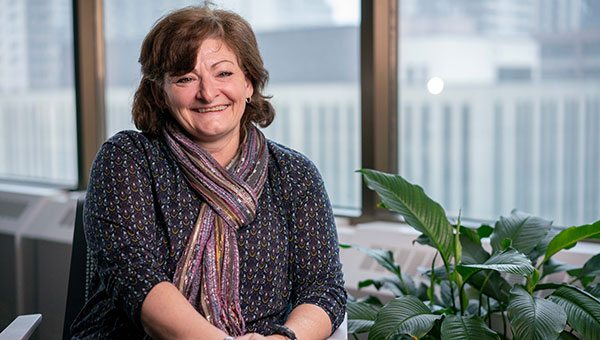- The stories of four Albertans working to slay their debt demons
- Injury and job losses push Calgarians to live off credit cards
- Fraudster ruined woman’s plans for early retirement
- ‘Bad things happen to good people’
Special Report
Part 3 in our five-part series Back in Balance
Name: Linda Pierce
Age: 53
Residence: Calgary
Occupation: Office administrator
At one of the lowest points in Linda Pierce’s 10-plus-year debt roller-coaster ride, she worked three part-time jobs while raising three teenage daughters. Amid it all, she suffered an ankle injury that required surgery, a week-long hospital stay, and six more weeks of being housebound and off her feet.
The loss of income and independence only exacerbated her financial straits as a single mother. Her choices were limited.
“I had to live off my credit cards,” Pierce says. “There were times when I wasn’t sure I’d be able to put food on the table but I made it work.”
Besides paying everyday bills, she felt it was important that her daughters, who dance competitively, continue with their lessons. “I could have cut back on that, but I tried to ensure they could continue doing what they enjoy,” she says.
Feeling she had no choice but to go back to her part-time job as an office administrator because it brought in the most income, she cut short the recovery time for her ankle and started to drive.
“By the second or third week, I got sick of relying on people … so I started driving so I was able to go to one of my jobs.”
Still, the bills kept coming and the job didn’t cover the bills. On top of it all, her strained relationship with her ex fuelled the stress.
“In mid-2004, I realized I needed help. … I was getting pretty bitter and my ex-husband was complaining more than helping,” Pierce says, adding they’ve since become friends.
“I was getting notifications that this or that was going to get cut off; things were piling up.”
That’s when she decided to seek the help of a credit counsellor. She felt better knowing that within four years her debts, totalling $10,000 at the time, would be paid off.
Meanwhile, she met the man who would become her current husband and he offered to pay off $10,000 of her debts right away. Their financial future was looking brighter and the couple decided to buy a house. Within a few months, however, they both lost their jobs.

What’s a consumer proposal? According to Bankruptcy Canada, a consumer proposal is an arrangement negotiated with your creditors through a consumer proposal administrator (a licensed insolvency trustee). It’s an alternative to personal bankruptcy. It’s still a legally-binding agreement giving people instant protection from debt collectors. Partial repayment of your total debt owed is arranged. Filing for a consumer proposal means you agree to pay a portion of your debts and your creditors forgive the balance. Between January 2017 and January 2018, there was a 15.2 per cent increase in people filing for consumer proposals in Alberta, according to Statistics Canada. |
“Things started going downhill again,” says Pierce. She found another job but at a $25,000 pay cut. Unhappy in the new job, Pierce decided to leave for another one – a job that paid even less. “I knew bills had to be paid but I can’t work in a job where I’m not happy.”
When her husband suffered an injury and couldn’t work, the couple decided they had to seek help. They were about $50,000 in debt in addition to their mortgage.
“I felt like we were drowning in it all.”
Again, Pierce decided to seek outside help with a credit company, which referred her to Calgary-based Bromwich + Smith, debt specialists and licensed insolvency trustees.
Their Bromwich + Smith debt relief specialist suggested they enter into a consumer proposal, an alternative to personal bankruptcy. It’s a legally binding agreement with your creditors through a licensed insolvency trustee, protecting the debtor from collectors. Through negotiations, people may make a portion of the payment and the balance can be forgiven by creditors.
“Linda’s story is an all too common one that, sadly, people aren’t comfortable sharing,” says Shawn Stack, a licensed insolvency trustee with Bromwich + Smith.
Stack says personal relationships often have commonalities with financial arrangements.
“Sometimes the arrangements that we make in the beginning of the relationship aren’t able to be kept throughout until the end. Just as Linda eventually reconciled with her ex-spouse and was able to become friends, the consumer proposal that we helped her with allowed her to do the same with her creditors. All she needed was an independent party like us to step in and actually mediate,” Stack says.
Linda was more fortunate, unlike Amy Mahon in our previous story, because she had a higher income.
Stack explains that Pierce’s family income was greater than the amount exempted by the federal government.
“What this meant was that if Linda went into bankruptcy she would be required to make monthly payments to the creditors based upon a calculation and not based upon her personal budget,” Stack said.
Bromwich + Smith helped Pierce devise a budget that let her keep a reasonable standard of living, but also allowed her to make monthly payments to her creditors. It was less than a monthly bankruptcy payment and offered more to her creditors over a longer period.
“The creditors were more than happy to accept the settlement that we arranged for her because we are independent officers of the court and our role in the community is to do precisely this,” Stack said.
Four years later, Pierce and her husband are inching toward debt freedom. “October 2018 will be my last payment and I’ll be drinking some wine. I plan to celebrate.”
She and her husband are looking forward to the day they can start planning for the future and saving money.
“We’ve learned how to properly manage day to day with the money we have. It’s been a long haul and there were days I thought it would never end. Now I know that, I feel a weight has been lifted off my shoulders and I can start to enjoy working and my family.”
Their only debt will be a manageable mortgage.
“We’re relieved this is almost over. If (my story) helps two or three people see there is light at the end of the tunnel, it’s worth it.”
This feature was produced in partnership with Bromwich + Smith and Troy Media.
The views, opinions and positions expressed by columnists and contributors are the author’s alone. They do not inherently or expressly reflect the views, opinions and/or positions of our publication.


